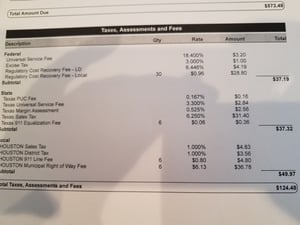
If you have ever paid a phone/internet bill, you have undoubtedly noticed the long list of additional fees and charges. Most of us just grit our teeth and pay, without a good understanding of why they are there in the first place. Today we will provide a closer look at these charges. After all, they account for approximately 20% to 30% of our monthly bill! Are they all required local, state and federal taxes, or are some "tacked" on at the discretion of the carrier? We will begin by breaking down the surcharges and fees and then we will point out a few areas of costs savings you might realize with a more careful analysis of your phone and internet bills.

We took a look at two different carrier invoices provided by two of our clients. Interestingly enough, the additional charges for both carriers amount to 21% of the total amount of the invoice. One carrier breaks these charges down into two categories "Other Charges and Credits" and "Taxes and Fees" while the other carrier breaks the fees down into Federal, State and Local. Regardless of the descriptions of the fees and charges, the basic percentage is the same.
Here is an explanation of some of the standard fees you will find on your monthly bill:
Federal Universal Service Fee: These funds go to the Federal Universal Service Fund which is allocated as discounts to schools, libraries and rural areas for phone services.
Texas Universal Service Fee (TUSF): Similar to the Federal program, its purpose is to subsidize high-cost telecom services in rural areas and lower fees to schools and government agencies in Texas.
Regulatory Recovery Fees: These are not FCC mandated, but carriers are allowed to pass through fees they pay to the FCC for regulatory services.
911 Fee and Equalization Fee: These are charged by the carrier and usually amount to $.50 per line, and are passed on to emergency services organizations to help cover the cost for Caller ID automatic number and location identification services. The equalization surcharge applies to intrastate long distance services.
Municipal Right of Way (ROW) Fee: Carriers add this charge to cover fees paid to municipalities for the use of right-of-ways such as the areas on, below or above public roads.
Voice Network Investment: This fee is non-mandated, but allowed. It is used to cover investments in network and technology to ensure that they maintain a high quality network for voice customers.
State Cost Recovery Charge: Another non-mandated fee, but it can be charged by the carrier to recover the State franchise tax.
Hot Tips for Cost Savings: Check your invoice for other fees such as Voicemail or Call Notes. If you are using the voicemail system included with your phone system, you shouldn't be paying for these services. Also check for Web-Hosting charges. Unless your phone/internet provider is also hosting your website you shouldn't be paying for this service either. Don't pay for Call Forwarding features if you are not using them and don't plan to.
What is the bottom line?
While some of these fees are not mandated by government they are being recouped in one way or another by carriers and providers across the board. They may use different terms to describe or explain it, but in the end we are going to pay another 20% to 30% of our bill for services for these fees and surcharges. Remember this next time you are shopping for a carrier. Many quotes will have a blanket "plus fees and surcharges" disclaimer. For a more accurate monthly cost estimate, expect to pay 20 to 30% more.



 Unetek
Unetek 